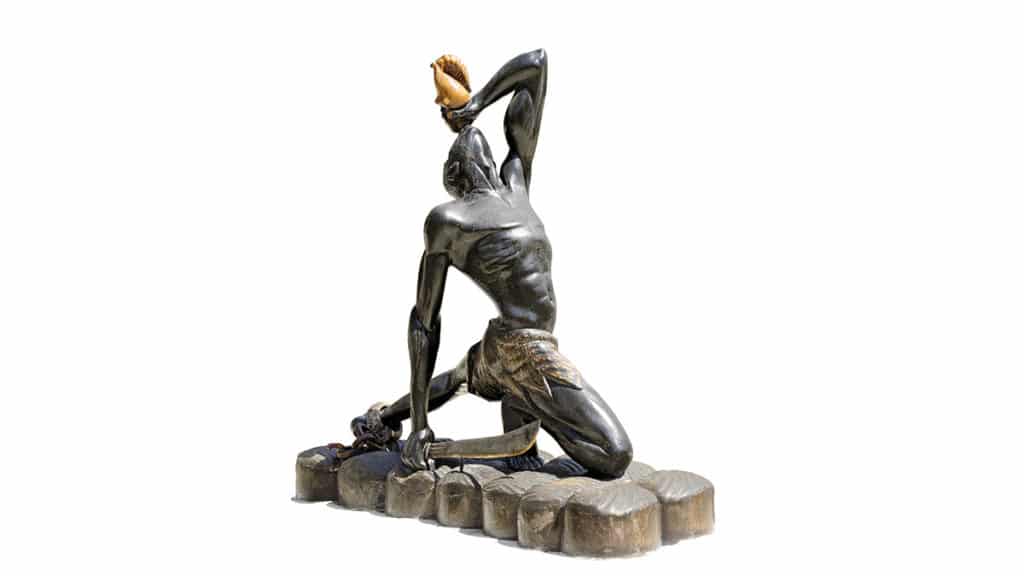The Haitian Revolution was one of the turning points in history. It was the only time that a people freed themselves from human slavery and founded a nation. Though there were many and constant uprisings against enslavement, this was the one that succeeded and broke the false colonial narrative that Africans and all people of color are inferior to Europeans. This was the beginning of the end of Transatlantic Slavery.
A Great Humanitarian Achievement

After more than a decade of terrible struggle, the Haitian Revolution led to the:
- First free country in Latin America
- Second republic in the Americas (after the United States)
- Only nation in history founded from a slave revolt
It was a striking achievement for people in chains to defeat France, one of the strongest military powers of the day. It also changed the course of American history. The French defeat was one of the causes for the Louisiana Purchase of the middle slice of what is now the United States.
The Haitian Revolution of 1791-1804 was inspired by the American Revolution of 1775-1783, and the French Revolution of 1789-1799. Haitians believed that, as French citizens, the French Revolution motto “Liberté, Egalité, Fraternité” (Liberty, Equality, Fraternity) applied to them too. At first the fight was for freedom as French citizens, but it soon became clear that the French were committed to human slavery.
A Brutal Revolution
Like all revolutions, the Haitian Revolution was brutal on both sides. European complaints of inhumanity are hypocritical because French slavery in Haiti was one of its most brutal forms. People trafficked to Haiti lived on average for just a year or a year and a half. The French worked people to death and used sadistic punishments to maintain control. This was done in the name of the French god which makes you wonder what kind of god that is.
Saint-Domingue (Haiti’s French name) was the most profitable French colony. It was so profitable that it attracted other European powers to the Caribbean. African blood paid for many of those beautiful buildings and estates in France, and allowed the accumulation of capital that made Western Europe rich.
Immediately after independence in 1804, Haitians realized that the French hoped to return and restart human slavery. Haitian soldiers, led by Jean-Jacque Dessalines, rampaged through the country, systematically killing all the remaining French, and destroying all the French means of production. That was brutal, but would you allow someone to enslave you again, or knowing full well what that means, would you fight them to the death?
Americans know the phrase “Give me liberty, or give me death.”
A Taproot of African American Culture
The Haitian Revolution also triggered a diaspora across the Caribbean, including to Trinidad and New Orleans. By 1810, half the population of New Orleans was Haitian Diaspora. That’s important because Haiti is one of the taproots of African American culture.
Fearing uprisings, the Americans took away the African drum, and we got gospel, ragtime, and the blues ~ the roots of almost all American popular culture. The blues gave us jazz, swing, rock, hip hop, and basically all the popular music and dances of the United States. The Jazz Age of the 1920s-1930s defined American culture.
Europeans and Their Diaspora Like to Pick on Haiti and Haitians
Fearing more uprisings, the Europeans (including the United States) did everything they could to deny their responsibility and make the Haitians look bad. The French invited Revolution leaders to talk, but simply imprisoned and killed them.
The French Navy returned in 1825 and forced the young country to pay French slaveholders a debt of 150 million francs for the loss of their assets, or the Navy would flatten Port-au-Prince. That was a bad deal. The slaves should have been paid for their suffering, not the abusive owners.
It was ten times more than what the Americans paid for the Louisiana Purchase which doubled the size of the United States, about $20-30 billion in today’s dollars. It took Haiti 122 years to pay that off. Without capital to invest, the young country was forced into destitution, and still struggles from the loss.
Haitians Should be Celebrated For Their Accomplishment
French and its American and European collaborators are fully responsible for the problems in Haiti today. The problems are blamed on Haiti’s African and Vodou heritage, but the real problem is White Christians, the world’s most violent people (the exact opposite of the teachings of Christ).
There is nothing bad or scary about Vodou. It’s a beautiful, highly developed religion that seeks to help its followers achieve their maximum human potential. All those scary Vodou stories are Hollywood nonsense written by American soldiers after their occupation of Haiti from 1915-34. They observed Vodou traditions, but completely misrepresented what they saw.
Once upon a time on this island, an extremely marginalized people achieved the impossible. It was messy, but it was a great humanitarian achievement. Instead of being punished with no end, Haiti and Haitians should be celebrated.
More Information
This website on the Haitian Revolution was developed by Kona Shen at Brown University in 2022. It has the deepest and clearest information that we have found. thehaitianrevolution.com
